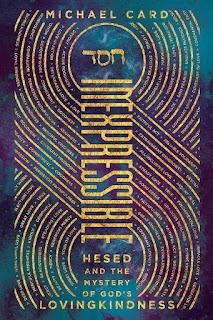This week I am reading again John Piper’s short book, When the Darkness Will Not Lift. He makes the following comment:
“In fact the darkest experience for the child of God is when his faith sinks out of his own sight. Not out of God’s sight, but his. Yes, it is possible to be so overwhelmed with darkness that you do not know if you are a Christian—and yet still be one… We are not saved by producing faith on our own and then making that the basis of our new birth. It is the other way around, which means that God is at the bottom of my faith; and when it disappears for a season from my own view, God may yet be there sustaining its root in the new birth and protecting the seed from destruction.”
I’ve had times like that when—because I can’t see what God is doing—I question whether I’ve ever really had faith in Him or I’ve only had faith in my own abilities and insights. I look back over my life and wonder whether I was consciously following God’s direction or if He was dragging me places I didn’t want to go. In better times, I remember the ways God has used the twists and turns of my path to bring me to new places and ways to serve Him.
The enemy would have us forget every Divine providence, every nudge of the Spirit that has directed us, every sign of our faith at work. As Piper indicates, even saving faith is a gift of God. “For by grace you have been saved through faith. And this is not your own doing; it is the gift of God, not a result of works, so that no one may boast” (Eph. 2:8-9). If we start to think we had anything to do with the origin of our faith, it’s only a short step to thinking we could therefore lose our faith. But what God has truly given cannot be removed: “I give them eternal life, and they will never perish, and no one will snatch them out of My hand” (John 10:28).The answer to doubt is to remember what God has done, starting with Scripture and continuing through the present day. How many times is the Exodus referred to in the Bible? It is frequently repeated (e.g. Psalm 66, 77, 78, 106), because we all need frequent reminders of God’s power and authority over all the earth. I may not see or understand how God is at work today, but that doesn’t negate the fact that He has made His presence known in many times and many ways since the beginning of creation.
“Remember the former things of old; for I am God, and there is no other; I am God, and there is none like Me, declaring the end from the beginning and from ancient times things not yet done, saying, ‘My counsel shall stand, and I will accomplish My purpose’” (Isaiah 46:9-10).
I have a shelf full of journals in my bedroom that go back more than 20 years. Even without opening them, I remember some of the things that I wrote there, and I am reminded that God has been at work over those many years—changing me, freeing me from certain sins, helping me to endure hard times, and using me for His good purposes. On the radio today I heard some discussion of how many people would go back in time if they could. Even though there are things I wish I could change right now, I have no desire to go back to who I was 10 or 20 or 30 years ago, and I can only attribute that to the fact that God has been at work even when I couldn’t see it. That may not relieve the present darkness, but it does help me put it in perspective of God’s enduring love and grace.
“Bless the Lord, O my soul, and forget not all His benefits, who forgives all your iniquity, who heals all your diseases, who redeems your life from the pit, who crowns you with steadfast love and mercy” (Psalm 103:2).
***
Here’s a related article from ChurchLeaders.com that I found helpful.
© 2022 Dawn Rutan. Unless otherwise indicated, all Scripture are ESV. Image copyright free from pixabay.com, revised by Dawn Rutan. The opinions stated do not necessarily reflect the views of my church or employer.







